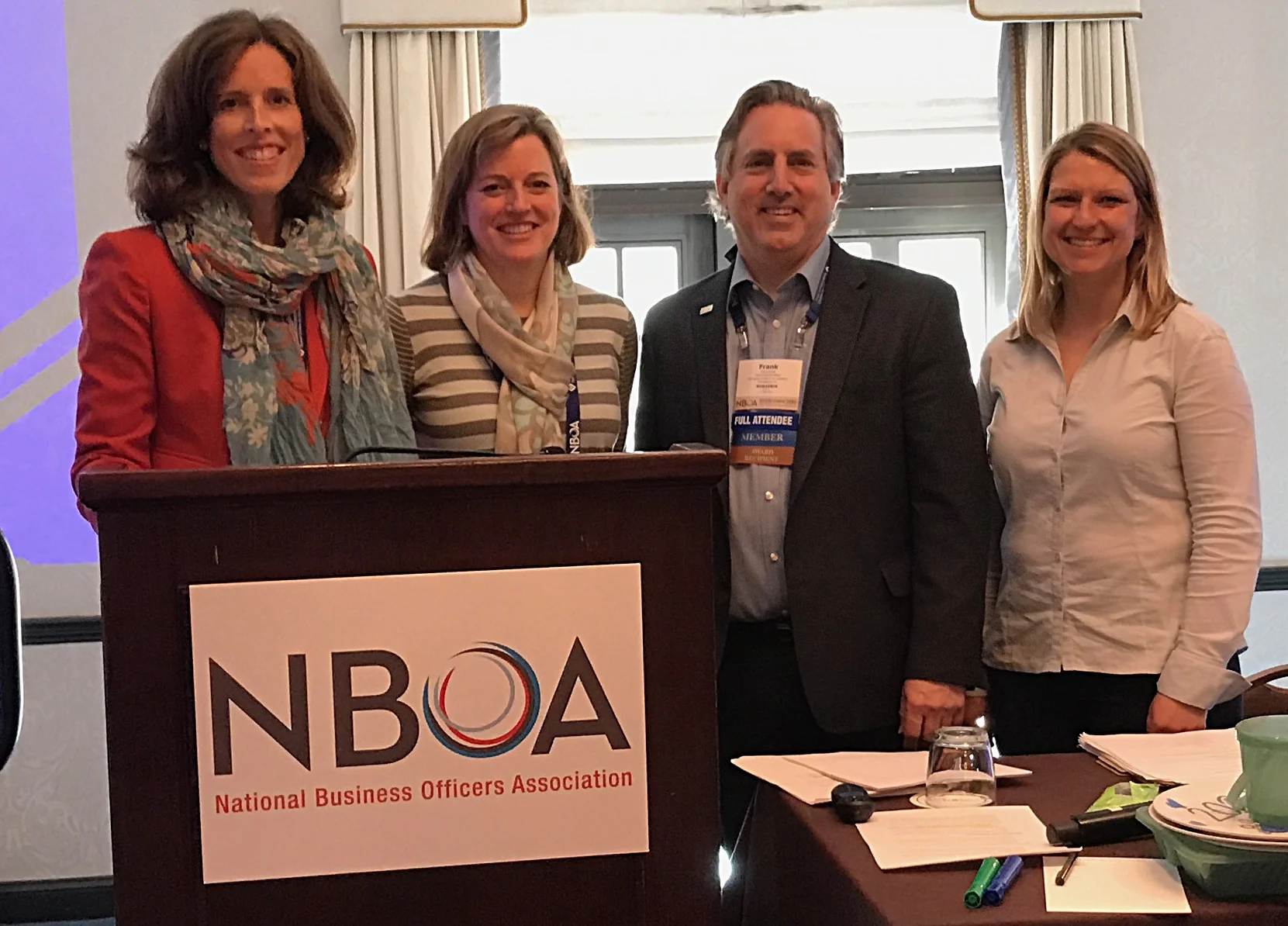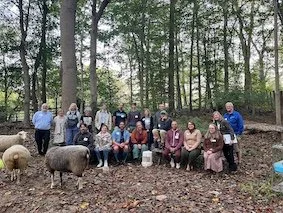Twenty-three educators, sustainability coordinators, and administrators from PAISBOA member schools gathered at The School in Rose Valley (SRV) for the PAISBOA Sustainability meeting, co-organized by PAISBOA and Boyer Sudduth Environmental Consultants (BSEC) on October 9th, 2025. This event provided a space for participants to share ideas, highlight campus initiatives, and strengthen connections around environmental sustainability.
2025-2026 Grants to Green Your School
Growing a Sustainable Culture in Our Schools: AIS Hosts the PAISBOA Sustainability Meeting
On Wednesday April 30th, more than 30 educators, sustainability coordinators, and facilities staff from PAISBOA member schools came together for the group’s semiannual sustainability meeting, co-organized by PAISBOA and Boyer Sudduth Environmental Consultants (BSEC). This spring’s gathering was hosted by The Agnes Irwin School (AIS) and offered a space to share ideas, explore campus initiatives, and build connections around school sustainability.
The Hidden Cost of Food Waste and How You Can Address it Locally
Every day, the average American produces 4.9 pounds of trash — a staggering amount that contributes to overflowing landfills and environmental harm. A significant portion of this waste comes from food. In fact, 30-40% of the U.S. food supply is wasted, the equivalent of bringing home three grocery bags and tossing one straight into the trash.
By making small changes, we can reduce waste, save money and help protect the planet. Let's make every day Earth Day, starting with what's on our plates.
Leave the Leaves: A Teachable Moment
Fallen leaves provide crucial winter protection for insects and invertebrates like butterflies, moths, and beetles. For example, wooly bear and great spangled fritillary caterpillars rely on leaves for warmth and food. By participating in the “Leave the Leaves” campaign, schools can support these ecosystems on their own grounds. Imagine designating a section of the schoolyard as a “wild zone” where leaves are left undisturbed, creating a living laboratory for students to observe changes throughout the seasons.
2024-2025 School Grants
Six Grant Writing Tips to Green Your School
“Leading Change: Environmental Sustainability at Your School” Panel Discussion
On March 8, the PAISBOA Sustainability Group hosted a virtual panel discussion: “Leading Change: Environmental Sustainability at Your School.” Panelists included Lisa Carbone Warren, Director of Finance & Operations at Moorestown Friends School (MFS), and Carolyn Hapeman, Dean of Finance & Operations at Westtown School and Mary Ann Boyer of Boyer Sudduth Environmental Consultants.
Celebrating Trees: Is Your School Arboretum-Worthy?
Schools Re-imagine Outdoor Spaces
Studies show that being outside in nature has the ability to calm and heal. Spending as little as 15 minutes in nature lowers cortisol stress levels and blood pressure. Nature helps foster our creativity and observation skills. With the increase of screen time, we often forget to unplug and head outside.
Join the Team!
Tools for Moving Your Campus to 100% Clean Energy
Educational institutions are instrumental in accelerating the transition to clean energy. As centers of scholarship, innovation, and technical expertise, they are well-positioned to lead the charge towards sustainability. Here are tools educational institutions can use to transition to clean energy as outlined in Environment America’s fact sheets, which can be found at https://environmentamerica.org. While written with higher education institutions in mind, much of the report’s guidance is applicable to K-12 schools as well.
Climate Change: From Classrooms to Community -- Revisiting Climate Change Teacher Training
On Saturday, January 25th, 2020 a group of dedicated teachers braved rainy weather to attend a Philadelphia GreenFutures Climate Change Teacher Training Workshop at Fairmount Water Works. A partnership between environmentally focused organizations organized this event for Philadelphia School District teachers to discuss their progress following last summer’s three-day summer climate education workshop.
Aquaponics in the Classroom: PAISBOA Sustainability Group Visits Agnes Irwin School
The PAISBOA Sustainability Group convened at The Agnes Irwin School (AIS) on January 14th. Head of School, Dr. Wendy Hill, welcomed over 36 participants from 13 different institutions and highlighted how sustainability has been integrated into the buildings and classrooms at AIS along with a special focus on aquaponics.
Summer with the Children's Environmental Literacy Foundation
The Children’s Environmental Literacy Foundation (CELF) is a non-profit organization located in Valhalla, New York, which works to integrate education for sustainability into school curricula and culture. One of our interns, Casey, spent her summer working for CELF and has written an article to share her reflections on her experience!
First Graders Make a Difference with Waste Free Lunches
During the beginning of school last year, first grade students in Brooke Donovan’s class conducted a classroom waste audit. “We took a close look at the amount of trash we generated after one lunch. Students counted the number of yogurt cups, plastic forks and knives, juice boxes and other trash that we generated” she noted. “Then they discussed what they could do to reduce this waste.”
Derby Academy earns National Wildlife Federation Eco Schools Bronze Award
On the morning of April 22nd, Derby Academy students and faculty gathered to kick off Earth Week with a presentation on how to tackle today’s environmental challenges by Anne Sudduth of Boyer Sudduth Environmental Consultants. The address then culminated in the presentation of the National Wildlife Federation Eco Schools Bronze Award to the Derby community.
Reading High School Students Celebrate Plans for a New Courtyard
Teachers’ Bright Ideas About Energy Workshop
On March 16, 2019, Boyer Sudduth helped to run the Bright Ideas About Energy Workshop at the Franklin Institute. This workshop consisted of twenty-two sustainable minded teachers from the Philadelphia region seeking to enhance their understanding of energy conservation and develop tools to bring back to the classroom.
Reading High School’s Green Committee Takes a Fresh Look at its Interior Courtyard
We’ve been working on something new…
Since August 2018, Boyer Sudduth Environmental Consultants met to organize, brainstorm, and plan -- and then organize, brainstorm and plan again, with Reading High School students, teachers and staff to develop a vision for a project that would invigorate their environmental education and school sustainability. Now it’s time for the big reveal…The Living Learning Laboratory Project. Reading High School will transform their unused school courtyard into a vibrant, biodiverse space where students can engage in hands-on STEAM learning outdoors.
The Green Committee at Reading High School believes “This project will foster a generation of citizens who are prepared to become creative and innovative leaders, to take care of their environment, and to actively participate in their community for years to come.” We think so, too!
Reading High School’s Green Committee members
RHS’s Green Committee of faculty and students review design drawings by Structure Green’s Ann Sellers (pictured second from left)
A section of the existing courtyard at RHS which will be renovated into a new outdoor learning space.
Science teacher and Green Committee faculty leader, Jeannine Michel, with one of RHS’s courtyard inhabitants--Big Mamma
We are so excited to work with a talented group of people: the students of the Eco Club, Faculty Green Committee Lead and Environmental Science teacher, Jeannine Michel (pictured below), landscape designer Ann Sellers, and agriculturalist Kent Himmelright of the Berks County Conservation District to make this vision possible. On April 11, the School will have a “Green Between” event from 3 to 5 pm with area community partners to raise awareness about the plans for the Courtyard. We hope to break ground late spring and during the summer. Check back in with us as this courtyard, and the Reading High School community, transform.
By Emma Schlam, Sustainability Intern at Boyer Sudduth Environmental Consultants, and grad student at Clark University pursuing dual degrees in Master of Business Administration and Master of Environmental Science and Policy.

























